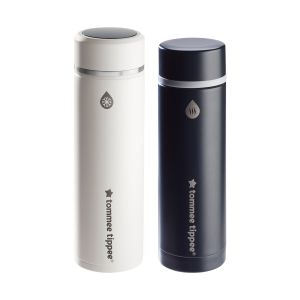
This is a demo store. No orders will be fulfilled.
Subscription orders can be cancelled at anytime. Free delivery on all subsequent subscription orders. Find out more about subscriptions.
They’re easy and fuss free
Your products are automatically sent to you
You save up to 10% when you sign up for a subscription
You can cancel at any time
Growing babies need to feed regularly. But because a ���normal��� feeding schedule can vary greatly from one baby to the next, many parents worry about the possibility of overfeeding their little one.
Don���t worry though, overfeeding is rare and can be easily prevented. Let���s run through common overfeeding concerns for babies who breastfeed and bottle feed, and cover what you can do to avoid overfeeding your baby.
During the early days, it may seem like your newborn baby is feeding a lot, but don���t worry, this is completely normal!
A newborn baby���s stomach is only the size of a cherry and can hold around five to seven millilitres, so they will need to feed little and often at first.
No, if your baby is breastfed, it���s not possible to overfeed them. Although it may seem like your baby is feeding a lot, this is simply because their tummy is very small at first and breast milk is easily digested.
Breastfeeding isn���t just about your baby getting enough breast milk: they also feed or suckle for comfort and reassurance. So, you shouldn���t worry about feeding them whenever either of you wants to ��� whether that���s because they���re hungry, your breasts feel full and engorged, or you just want to have some skin-to-skin contact and a cuddle.
A breastfed baby who���s fed whenever they're hungry or in need of the comfort of your breast won���t become demanding or be ���spoiled���. The truth is, all breastfed little ones are different, and you���ll be able to work out your tailor-made feeding pattern together.
Signs that a breastfed baby is full and has decided not to drink any more milk include detaching themselves from your breast or falling asleep at your breast. These behaviours show that they���re able to recognise what being full feels like, so they���re unlikely to overfeed.
Yes, it can be easier to accidentally overfeed a bottled-fed baby. This is because it���s harder for them to control the speed that their milk flows through the bottle���s teat as they feed.
Bottle-fed babies will usually refuse a bottle or push the teat away from their mouth when they feel full and have fed for long enough. So, don���t be tempted to unintentionally pressure them and never force your baby to finish a bottle if they don���t want to.
It���s natural to worry about how much milk your baby takes while bottle feeding, but you can usually rely on their weight gain growth charts and the frequency of wet and dirty nappies to reassure you that they���re getting enough milk.
Although uncommon, overfeeding a baby can cause���
In addition, ignoring the signs that your baby gives you to show that they���re full can make mealtimes stressful for everyone involved. It could also lead to unhealthy mealtime habits and a negative association with food.
To avoid overfeeding your little one, it's better to offer them less milk during a feed, rather than more. That way, you can always give them a little extra if needed and they have time to realise when they're feeling full and satisfied.
You should practice responsive or paced feeding and stick to feeding them when they show signs that they want to feed. These signs are known as hunger cues or signals and include���
Likewise, you should avoid pressuring your baby to feed when they���re not hungry. Keep an eye out for signals your baby will give to let you know that they���re full. These include���
If you have any questions or concerns about your baby's feeding schedule or weight gain, don���t hesitate to speak to your doctor or health visitor for advice and support.